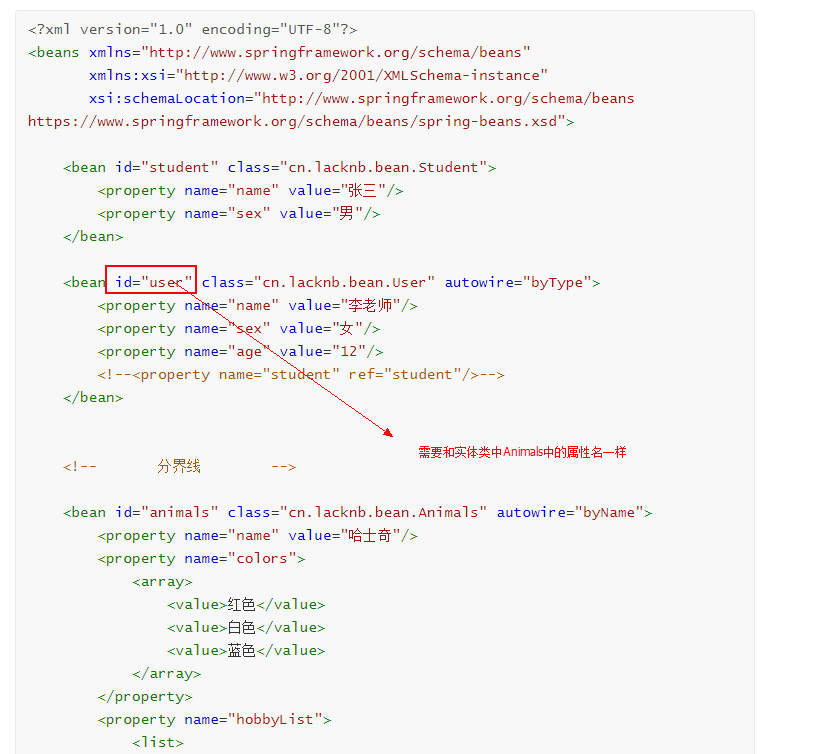 gitsilence 的个人博客
gitsilence 的个人博客
Coding...
Spring的属性注入

基于xml文件的属性注入
构造方法注入
- 具体参照setter注入
<!-- 使用构造方法注入方式装配ConplexUser实例user1-->
<bean id="user1" class="com.model.ComplexUser">
<constructor-arg index="0" value="张三"/>
<constructor-arg index="1"> <!--构造方法中参数的位置-->
<list>
<value>唱歌</value>
<value>跳舞</value>
<value>爬山</value>
</list>
</constructor-arg>
<constructor-arg index="2">
<map>
<entry key="dalian" value="大连"/>
<entry key="beijing" value="北京"/>
<entry key="shanghai" value="上海"/>
</map>
</constructor-arg>
<constructor-arg index="3">
<set>
<value>陈恒 100</value>
<value>陈恒 101</value>
<value>陈恒 102</value>
</set>
</constructor-arg>
<constructor-arg>
<array>
<value>aaa</value>
<value>bbb</value>
</array>
</constructor-arg>
</bean>
<!-- 使用属性的setter方法注入方式装配 complexUser实例2-->
<bean id="user2" class="com.model.ComplexUser">
<property name="uname" value="李四"/>
<property name="hobbyList">
<list>
<value>看书</value>
<value>学习spring</value>
</list>
</property>
<property name="residenceMap">
<map>
<entry key="dalian" value="大连"/>
<entry key="beijing" value="北京"/>
<entry key="shanghai" value="上海"/>
</map>
</property>
<property name="aliasSet">
<set>
<value>陈恒 100</value>
<value>陈恒 101</value>
<value>陈恒 102</value>
</set>
</property>
<property name="array">
<array>
<value>aaa</value>
<value>bbb</value>
</array>
</property>
</bean>
setter方法注入
-
Student.java
package cn.lacknb.bean; public class Student { private String name; private String sex; public Student() { } public Student(String name, String sex) { this.name = name; this.sex = sex; } public String getName() { return name; } public void setName(String name) { this.name = name; } public String getSex() { return sex; } @Override public String toString() { return "Student{" + "name='" + name + '\'' + ", sex='" + sex + '\'' + '}'; } public void setSex(String sex) { this.sex = sex; } } -
User.java
package cn.lacknb.bean; public class User { private String name; private int age; private String sex; private Student student; public Student getStudent() { return student; } public void setStudent(Student student) { this.student = student; } public String getName() { return name; } public void setName(String name) { this.name = name; } public int getAge() { return age; } public void setAge(int age) { this.age = age; } public String getSex() { return sex; } public void setSex(String sex) { this.sex = sex; } public User() { } @Override public String toString() { return "User{" + "name='" + name + '\'' + ", age=" + age + ", sex='" + sex + '\'' + ", student=" + student + '}'; } } -
applicationContext.xml
<?xml version="1.0" encoding="UTF-8"?> <beans xmlns="http://www.springframework.org/schema/beans" xmlns:xsi="http://www.w3.org/2001/XMLSchema-instance" xsi:schemaLocation="http://www.springframework.org/schema/beans https://www.springframework.org/schema/beans/spring-beans.xsd"> <bean id="student" class="cn.lacknb.bean.Student"> <property name="name" value="张三"/> <property name="sex" value="男"/> </bean> <bean id="user" class="cn.lacknb.bean.User"> <property name="name" value="李老师"/> <property name="sex" value="女"/> <property name="age" value="12"/> <property name="student" ref="student"/> </bean> </beans> -
测试类 MyTest.java
package cn.lacknb.test; import cn.lacknb.bean.Animals; import cn.lacknb.bean.User; import org.springframework.context.ApplicationContext; import org.springframework.context.support.ClassPathXmlApplicationContext; public class MyTest { public static void main(String[] args) { ApplicationContext context = new ClassPathXmlApplicationContext("applicationContext.xml"); User user = (User) context.getBean("user"); System.out.println(user); } }
域属性自动注入 autowire
-
byName
- xml中的bean的id需要和实体类的属性名保持一致
-
byType
- 会根据类型查找, 如果出现两个相同类型会报错
- 如果出现需要查找实体类的子类, 也会报异常。
-
例子:
-
需要上面例子的两个实体类
-
Animals.java
package cn.lacknb.bean; import java.lang.reflect.Array; import java.util.*; public class Animals { private String name; private String[] colors; private List<String> hobbyList; private Map<String, String> hobbyMap; private Set<String> hobbySet; private Properties hobbyProps; private User user; public String getName() { return name; } public void setName(String name) { this.name = name; } public User getUser() { return user; } public void setUser(User user) { this.user = user; } public String[] getColors() { return colors; } public void setColors(String[] colors) { this.colors = colors; } public List<String> getHobbyList() { return hobbyList; } public void setHobbyList(List<String> hobbyList) { this.hobbyList = hobbyList; } public Map<String, String> getHobbyMap() { return hobbyMap; } public void setHobbyMap(Map<String, String> hobbyMap) { this.hobbyMap = hobbyMap; } public Set<String> getHobbySet() { return hobbySet; } public void setHobbySet(Set<String> hobbySet) { this.hobbySet = hobbySet; } public Properties getHobbyProps() { return hobbyProps; } public void setHobbyProps(Properties hobbyProps) { this.hobbyProps = hobbyProps; } @Override public String toString() { return "Animals{" + "name='" + name + '\'' + ", colors=" + Arrays.toString(colors) + ", hobbyList=" + hobbyList + ", hobbyMap=" + hobbyMap + ", hobbySet=" + hobbySet + ", hobbyProps=" + hobbyProps + ", user=" + user + '}'; } } -
xml配置文件
<?xml version="1.0" encoding="UTF-8"?> <beans xmlns="http://www.springframework.org/schema/beans" xmlns:xsi="http://www.w3.org/2001/XMLSchema-instance" xsi:schemaLocation="http://www.springframework.org/schema/beans https://www.springframework.org/schema/beans/spring-beans.xsd"> <bean id="student" class="cn.lacknb.bean.Student"> <property name="name" value="张三"/> <property name="sex" value="男"/> </bean> <bean id="user" class="cn.lacknb.bean.User" autowire="byType"> <property name="name" value="李老师"/> <property name="sex" value="女"/> <property name="age" value="12"/> <!--<property name="student" ref="student"/>--> </bean> <!-- 分界线 --> <bean id="animals" class="cn.lacknb.bean.Animals" autowire="byName"> <property name="name" value="哈士奇"/> <property name="colors"> <array> <value>红色</value> <value>白色</value> <value>蓝色</value> </array> </property> <property name="hobbyList"> <list> <value>吃骨头</value> <value>发出叫声</value> <value>吃狗食</value> </list> </property> <property name="hobbyMap"> <map> <entry key="1" value="吃骨头"/> <entry key="2" value="发出叫声"/> <entry key="3" value="吃狗食"/> </map> </property> <property name="hobbyProps"> <props> <prop key="1">吃骨头</prop> <prop key="2">发出叫声</prop> <prop key="3">吃狗食</prop> </props> </property> <property name="hobbySet"> <set> <value>吃骨头</value> <value>发出叫声</value> <value>吃狗食</value> </set> </property> </bean> </beans>
-
SPEL注入
-
随机数
<property name="age" value="#{T(java.lang.Math).random()*100}" />-
例如将上面的user中的age为随机数


-
-
获取实体类中的值 和 调用实体类中的方法
#{对象.属性}#{对象.方法} -
三目运算
#{user.age>30?30:user.age}如果输入的值大于30, 就取30, 否则就取输入的值。
基于注解的方式注入
在实体类中使用
-
@Component("组件的名字")
- @Value("属性值")
- @Autowired("byName或者byType") --- 对象自动装配
-
xml文件配置
<context:component-scan base-package="cn.lacknb"/> 扫描指定包下的所有的类
@Component
该注解是一个泛化的概念, 仅仅表示一个组件对象 ( Bean ), 可以通过作用在如何层次上
@Repository
该注解用于将数据访问层 ( DAO ) 的类标识为Bean, 即注解数据访问层Bean, 其功能与@Component相同
@Service
该注解用于标注一个业务逻辑组件类 ( Service层 ), 其功能与@Component相同
@Controller
该注解用于标注一个控制器组件类 ( Spring MVC 的Controller ), 其功能与@Component相同
@Autowired
- 使用@Autowired时, 首先在容器查找对应类型的bean
- 当查询结果刚好为一个时, 就将该bean装配给指定的数据
- 当查询结果不止一个时, @Autowired会根据名称来查找, 如果还是没有找到, 就会抛出异常.
- 当查询结果为空时, 会抛出异常, 可以使用@Autowired( required = false )解决.
@Resource
该注解与@Autowired的功能一样, 区别在于该注解默认是按照名称来装配注入的, 只有当找不到
与名称匹配的Bean时才会按照类型来装配注入; 而@Autowired默认是按照Bean类型进行装配的, 如果
想按照名称装配注入, 则需要和@Qualitier注解一起使用
@Resource注解有两个属性--name和type. name属性指定Bean实例名称, 即按照名称来装配注入;
type属性指定Bean类型, 即按照Bean的类型进行装配
@Qualifier
该注解与@Autowired注解配合使用, 当@Autowired注解需要按照名称来装配注入时需要和该注解
一起使用, Bean的实例名称由@Qualitier注解的参数指定.
在上面几个注解中, 虽然@Repository、@Service和@Controller等注解的功能与@Component注解相同, 但为了使类的标注更加气你(层次化), 在实际开发中推荐使用@Repository标注数据访问层(DAO层)、使用@Service标注业务逻辑层(Service层)、使用@Controller标注控制器层(控制层)
例子
-
创建DAO层 --- TestDao.java
package cn.lacknb.dao; public interface TestDao { public void save(); } -
创建TestDaoImpl.java
package cn.lacknb.dao; import org.springframework.stereotype.Repository; @Repository("testDao") /* * 相当于@Repository, 但如果在service层中使用@Resource(name = "testDao"), testDao不能省略 * */ public class TestDaoImpl implements TestDao { @Override public void save() { System.out.println("testDao save"); } } -
创建Service层 --- TestService.java
package cn.lacknb.service; public interface TestService { public void save(); } -
TestServiceImpl.java
package cn.lacknb.service; import cn.lacknb.dao.TestDao; import org.springframework.stereotype.Service; import javax.annotation.Resource; @Service("testService") // 相当于@Service public class TestServiceImpl implements TestService { @Resource(name = "testDao") // 注意这里@Resource中参数不止一个, 所以不能直接写testDao // 相当于@Autowired, 只不过@Autowired默认按照Bean类型装配, Resource默认是按名称装配 private TestDao testDao; @Override public void save() { testDao.save(); System.out.println("testService save"); } } -
创建Controller层 --- TestController.java
当一个组件在某个扫描过程中被自动检测到时,会根据那个扫描器的BeanNameGenerator 策略生成它的bean名称。默认情况下,任何包含 name值的Spring“典型”注解 (@Component、@Repository、 @Service和@Controller) 会把那个名字 提供给相关的bean定义。如果这个注解不包含name值或是其他检测到的组件 (比如被自定义过滤器发现的),默认bean名称生成器会返回小写开头的非限定(non-qualified)类名。package cn.lacknb.Controller; import cn.lacknb.service.TestService; import org.springframework.beans.factory.annotation.Autowired; import org.springframework.stereotype.Controller; @Controller // 这里可以自定义名称, 默认为这个类的名称, 小写开头 testController public class TestController { @Autowired private TestService testService; public void save(){ testService.save(); System.out.println("testController save"); } } -
配置注解
<?xml version="1.0" encoding="UTF-8"?> <beans xmlns="http://www.springframework.org/schema/beans" xmlns:xsi="http://www.w3.org/2001/XMLSchema-instance" xmlns:context="http://www.springframework.org/schema/context" xsi:schemaLocation="http://www.springframework.org/schema/beans http://www.springframework.org/schema/beans/spring-beans.xsd http://www.springframework.org/schema/context https://www.springframework.org/schema/context/spring-context.xsd"> <!-- 扫描指定包下的组件--> <context:component-scan base-package="cn.lacknb"/> </beans> -
创建测试类 TestMoreAnnotation.java
package cn.lacknb.test; import cn.lacknb.Controller.TestController; import org.springframework.context.ApplicationContext; import org.springframework.context.support.ClassPathXmlApplicationContext; public class TestMoreAnnotation { public static void main(String[] args) { ApplicationContext context = new ClassPathXmlApplicationContext("applicationContext.xml"); TestController controller = (TestController) context.getBean("testController"); // 默认是该类的类名testController, 也可以在注解中自定义 controller.save(); } } -
运行结果
